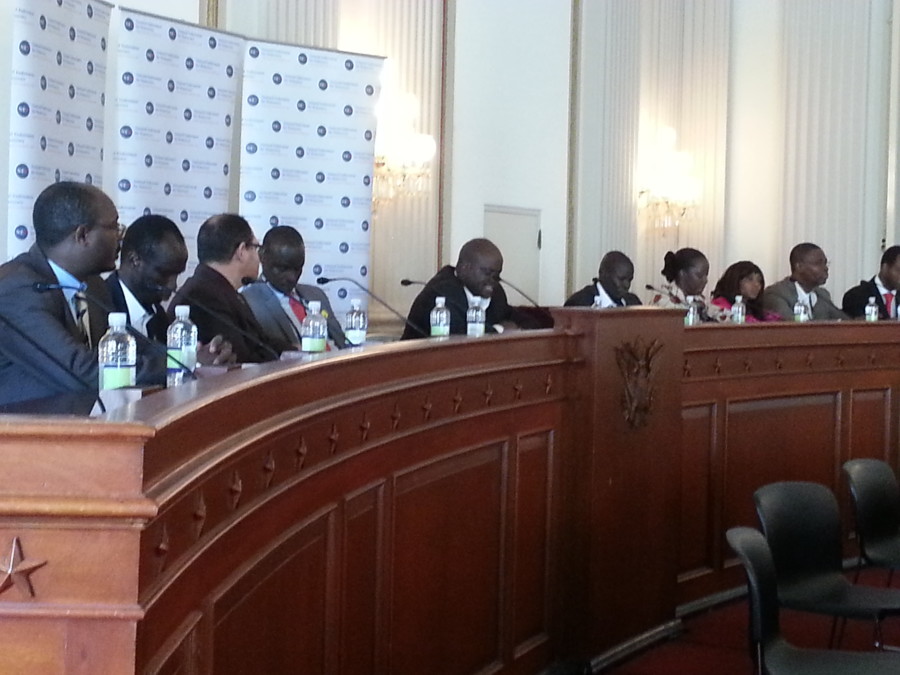Yesterday, we offered a behind-the-scenes look at what representatives of the media sector in Africa saw as the greatest challenges facing the region’s media development. Today, that group met in Washington to make recommendations on how to combat these challenges.
The panel’s spokesperson, Henry Maina of Article 19, said that the rapid change in Africa’s media environment has left the region with a degree of inconsistency. While positive developments such as mobile telephony and the Internet have created “new avenues for civic engagement and citizen participation,” these are far from ubiquitous in the region. Where they exist at all, the implementation of media laws, such as access to information or freedom of expression, is spotty.
Far and away, solutions will call for a multi-faceted approach–meaning that not only African governments, but also foreign governments, development agencies, inter-governmental organizations, and especially media practitioners should be held to account for the success of the media sector.
You can watch the entire presentation here (the media panel starts at the 2:00:00 mark). Below are the panel’s recommendations as presented in Washington this afternoon, in full, based on a document obtained by CIMA.
*********
Recommendations:
The media must be central to all discussions on Post 2015 Sustainable development goals and the ongoing USA-Africa trade partnerships.
US Government
- There is need for the USA government to deal with the incoherence that often times is witnessed between the rhetoric in Washington and the practice of respective USA missions in different countries;
- The government must seek to develop clear media support programme within its USAID programme portfolios;
- The must seek to balance its support of counter-terrorism processes and laws with clear protection of freedom of expression and media; and access to information.
Media Agencies
- International media networks must endeavor to cover Africa differently, holistically, as opposed to the continued narrative of Africa being the hopeless continent of disease, death and desperation
Government
- All governments must review and repeal all repressive laws that unduly restrict freedom of expression, media freedom and access to information. Some of such laws include but are not limited to criminal defamation, insult, sedition, publication of false news;
- Using the ACHPR Model Law on Access to Information as a minimum benchmark, all governments must pass, review and implement comprehensive access to information laws;
- All governments where there are pending cases of violations of media freedom cases must institute credible and independent investigation processes and bring to justice all those deemed to be culpable in those violations;
- Establish independent media regulatory mechanisms with a view to ensure media pluralism, diversity and transparency in broadcasting and telecommunications frequency spectrum allocation and management;
- Utilise the African Peer Review Mechanism, UN Universal Periodic Review processes and recommendations to improve on the situation and role of media in development;
- Establish clear and transparent policies on proportionate state advertising that promotes independent media and is not used to stifle critical media organisations.
Inter-Governmental Organisations
- All inter-governmental organisations must develop clear media support programmes and where possible designate specified quotas of their resources to media development work;
- That the World Bank, African Development Bank and UN agencies should offer leadership by promulgating access to information policies that enable African citizens to know their dealing with their respective governments but also develop clear programme support to the media;
- The UN treaty bodies and special mandate holders must underscore the centrality of freedom of expression, media freedom and access to information as fundamental rights but also instrumental rights in protection of economic and social rights;
- The African Union Commission must show leadership in assisting states to ratify and meet their obligations under the international and regional human rights treaties and support positive comparative learning across the continent;
- The African Commission on Human and Peoples Right must be supported to undertake both monitoring and promotional work;
- The African Union Commission under the legal directorate must review the African Convention on Cyber Security to ensure that it is an enabler of the efforts to make African economies knowledge and information based economies and in line with the 2063 developmental needs;
- Support the raising of awareness and implementation of the UN Action Plan
Development Agencies and Civil Society Organisations
- All development agencies must advocate for inclusion of media freedom, freedom of expression and access to information in the ongoing Post 2015 Sustainable Development Goals
- Set up clear programme to offer legal and other support to journalists in distress across the continent;
- Civil society organisations must be develop clear programming to support media freedom and not just use media as a communication tool for their work.
Media practitioners and Media Owners
- Media practitioners must organize themselves better at national and continental level and offer support and solidarity to their colleagues and peers in distress in specific countries;
- Media houses must develop and implement comprehensive gender and sexual harassment policies;
- Support women journalists through targeted mentorship programme(s) to enhance retention and career progression;
- Support self-regulation initiatives and partner with universities (national, international) to develop professional training programmes that enhance professionalism and specialization in reporting on different developmental issues.
Private Sector
- Encourage multinational corporations to advertise and invest in select media houses in different countries in Africa both in direct broadcasting stations and also in local production houses, distribution.


Comments (0)